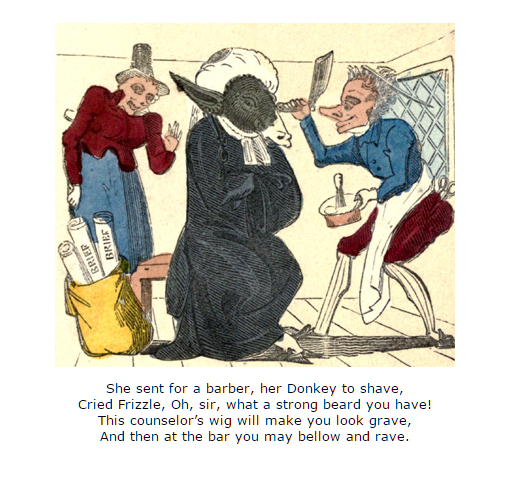Weekly Notes: legal news from ICLR – 22 April 2016
This week’s collection of legal news and comment includes another court fees hike, the fate of the privacy injunction, a ban on making art in an art gallery, the mingling of caffeine and the printed word, and some other rather asinine stuff to divert you from your timesheets and deadlines. Privacy “The Law is an Ass”:… Continue reading
This week’s collection of legal news and comment includes another court fees hike, the fate of the privacy injunction, a ban on making art in an art gallery, the mingling of caffeine and the printed word, and some other rather asinine stuff to divert you from your timesheets and deadlines.
Privacy
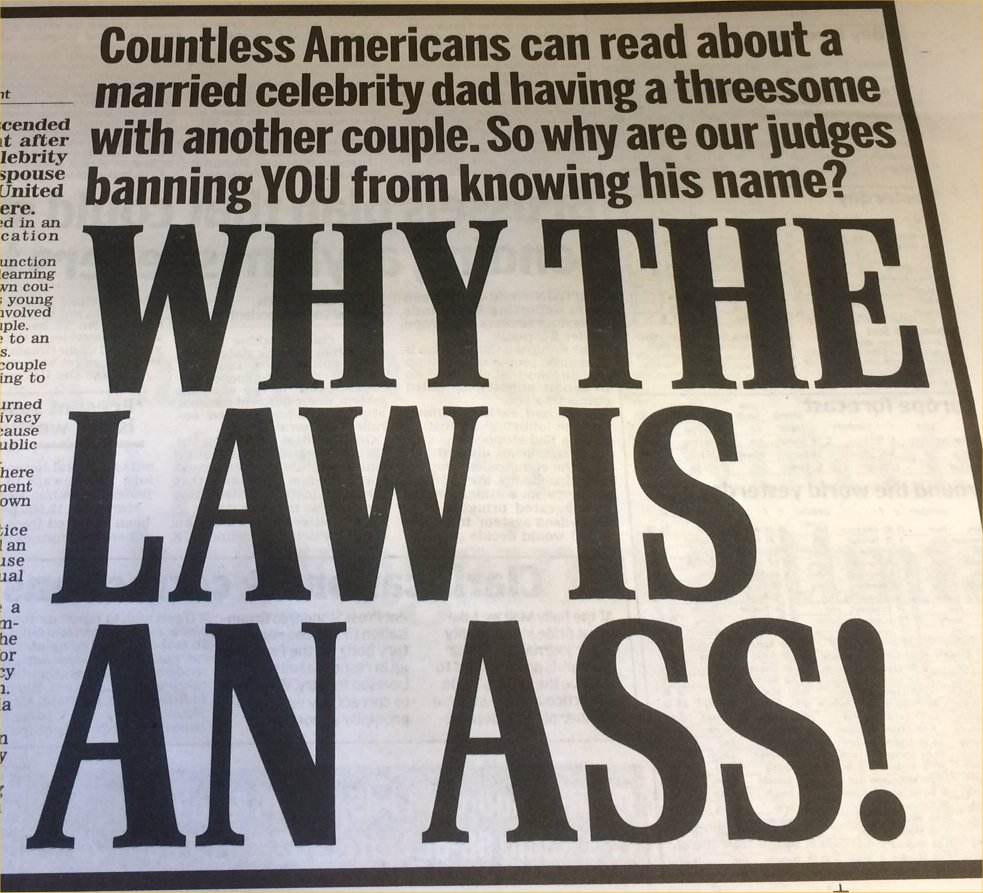
“The Law is an Ass”: is the privacy injunction dead?
On Friday the Court of Appeal heard and on Monday allowed (PJS v News Group Newspapers Ltd [2016] EWCA Civ 393) an application to discharge an (interlocutory) injunction previously granted ([2016] EWCA Civ 100) by the same court in January against News Group Newspapers, preventing it identifying a celebrity, married to another celebrity, with children, but at no time holding themselves out to be role models of monogamous fidelity, who had reportedly been involved in private consensual extramarital sexual activity of a tripartite nature with third parties. In other words, “three-way sex romps shocker” or words to that effect. So the story was out, but not the person involved. In the Court of Appeal’s view, at that earlier hearing, “the claimant had an expectation that his sexual encounters will remain private”.
But since the imposition of the original injunction, which only applied in England and Wales, the identity of the claimant had been disclosed in other jurisdictions and was therefore widely known. The newspaper applied to discharge the injunction by reason of its futility. The CA allowed the application on Monday (see case comment on Inforrm’s blog) but stayed the lifting of the injunction pending an application for permission to appeal to the Supreme Court. On Thursday the SC heard a “rolled-up” hearing for permission and, if given, the substantive appeal. They then reserved their judgment, so the injunction remains in place for the time being.
The case is mildly interesting to the curious public, but commentators have made two important points about it. First, that the whole argument about who PJS is and whether he is entitled to a private sex life without being kissed and told upon is a huge distraction from a far more important and widespread infringement of personal privacy, namely the extensive powers given to the security services to snoop on electronic communications. See, for example, David Allen Green in the FT, The Privacy Dances. (£)
Secondly, while continuation of the injunction may prove futile, the consequential damage to the law’s reputation is not so significant or urgent as to warrant promoting the hearing of this appeal by the SC in advance of other pending cases to which the court could have devoted its time on Thursday morning.
In fact, any damage to the law’s reputation may already have occurred, with headlines in the Daily Mail saying “the law is an ass” (see image) and so forth, reminiscent of the criticism of the courts for maintaining an injunction against publication of Peter Wright’s bean-spilling memoir Spycatcher at a time when the book was already widely available overseas (long before the age of the internet). If the Supreme Court allows the appeal and the privacy injunction dies, the Daily Mail are hardly likely to print a headline saying “Law Not Ass After All”.
But you never know. Perhaps they will.
Meanwhile, here is another image of a legal donkey, taken from the nursery rhyme, Deborah Dent and her donkey
Court fees
If at first you don’t succeed…
A massive rise in the fees charged for civil claims (up to £10,000 for some claims, with a further hike to £20,000 proposed) has resulted (in a way that seems to have been predicted by everyone except the MOJ) in a failure to raise the expected revenue to help plug the “black hole” in the MOJ budget, or as permanent secretary Richard Heaton put it in a letter to the House of Commons justice committee (quoted by the Law Society Gazette):
‘Fee income has also not matched our expectations. This is the result of several factors, including unpredicted volume changes following introduction of enhanced fees in March 2015,
Those “expectations” were “a set of assumptions agreed with the Treasury, which were viewed as ‘reasonable and realistic’” – ie that mugs would continue to stump up for civil claims and pay through the nose for the privilege. “Volume changes” were, to be fair, predicted by many commentators in the legal press and social media, but despite this, and despite a good deal of judicial dismay, the decision went ahead.
A similarly draconian rise in fees for employment tribunals introduced in July 2013 did, however, result in what some viewed as a welcome 70% drop in claims – describe as “red tape” by Matthew Hancock, Minister of State for Business, Energy and Enterprise giving a speech last year (see Weekly Notes – 27 February 2015)
So the news this week that fees for immigration claims are now to be hiked by up to 500% can only mean one thing. The economic justification having been exploded, the only justification remaining must be to deter as many claims as possible, or to see things Hancock’s way, to “cut red tape” in dealing with disappointed immigrants and asylum-seekers whose claims have been rejected.
Art
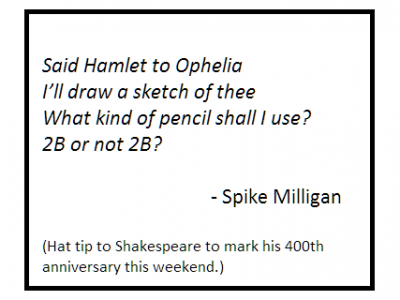 Sketchy basis for V & A ban
Sketchy basis for V & A ban
You might think the latest V & A exhibition, devoted to underwear through the ages, would be a big draw, and not just for those Arnold Layne types. But it seems that if you do attempt to draw any of the drawers on display in “Undressed: a brief history of underwear” you will face a stern prohibition, which is all the more astonishing since, traditionally, places like the V & A have always had art students and enthusiasts hanging about their galleries with pencil, pens and charcoal and a notebook or sketchpad to hand, recording their own impressions of the artwork on display.
A ban on photography is less unusual, but while the Tate imposes such a ban in its galleries, the Royal Academy does not, perhaps appreciating that the benefit of publicity through social media far outweighs any threat to intellectual property through photographic images of artwork (many of what are in any case already accessible via Google images and the like).
But does the ban on sketching at the V & A have anything to do with intellectual property protection, or is it more to do with maximising the profitability of special exhibitions? According to Oliver Wainwright, expressing his indignation in the Guardian,
the draconian rule, which was first introduced for the blockbusting David Bowie exhibition in 2013, has nothing to do with protecting intellectual property. A drawing, however realistically executed with the finest charcoal pencil, does not constitute a breach of copyright. Instead, according to a V&A spokesperson, it is to do with preventing congestion and the strict loan agreements the museum signs for each new exhibition.
People standing still and sketching would get in the way of the steady, monetised flow of timed-entry visitors, who will have paid £12 (or £13.50 including a donation) per adult ticket to get in. As 10cc once sang, “Art for art’s sake / Money for God’s sake….”
Wainwright wonders whether the museum will ban wheelchairs next, in the quest to speed the flow through the show. But, he says,
a rule banning sketching goes entirely against everything the institution has ever stood for.The studious reproduction of museum exhibits has long been a fundamental part of art education – a means of honing drawing skills and offering deeper ways of looking.
What worries me is that even if I am banned from using my smartphone to capture some images to tweet or put on my blog, I can never see an exhibition of any interest without wanting to jot down a few thoughts in my trusty pocket Moleskine. If I get out my notebook and pencil, will some officious security guard come up to me and tell to cease and desist? Perhaps even (by analogy with deleting an illicit photograph) erase my notes? What if, instead, I take out my iPad or smartphone, and use the notes app in that? These questions are speculative or rhetorical, because I’m not going to the exhibition. I’m going to boycott it. Let them monetise that, if they want to.
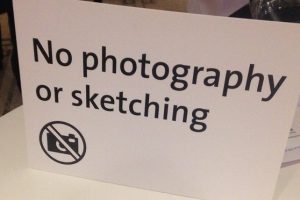
Books
Is the library dead – or does it just smell (of coffee)?
A timely, and eternal, plea from 3 Geeks and a Law Blog where Greg Lambert bemoans the all too tempting fad of turning libraries (he’s a law librarian) into “collaboration spaces” with pseudo related facilities like workstations and, er, coffee machines. You can read his blog here: Espresso Machines are Lousy Substitutes for Law Library Leadership. Crucially, he says:
Law Librarianship is not about the number of books on the shelf. It is not about turning shelves into collaboration spaces or coffee bars.”
Well, this brings me to two developments on territory somewhat closer to home. The Temple, in fact. First, to say that I actually don’t mind the fact that Middle Temple library has / offers coffee, as well as books, desk space, newspapers, computers, wifi and some very erudite and helpful law librarians. And as a member of the Inn I shame myself by not using its facilities more.
More worrying is what’s been happening next door, at Inner Temple. This is a fabulous working library, with wonderful collections, curious little galleries and corridors of books, rooms arranged in alphabetical order, and another bunch of erudite and helpful law librarians. Plus they publish an excellent current awareness service, alerted via Twitter. And yet, in spite of all this, the Inn itself wants to carve it up and reassign half the space to what might just as well be a coffee bar with collaboration stations (all right, “meeting rooms, offices and an auditorium for education and training”, under option 2).
Dates and Deadlines
Four Jurisdictions Law Conference
Middle Temple, Friday 6 to Sunday 8 May 2016
An opportunity for members of the Bar of England and Wales to get together with those of the Bars of Northern Ireland, the Republic of Ireland, and Scotland, for discussions both legal and social. Click here for details, and here for programme etc (PDF).
Looking ahead…
Cambridge Public Law Conference 12-14 September
In September 2016, the Faculty of Law at the University of Cambridge will hold the second biennial Public Law Conference.
Click here for List of speakers.
Law (and injustice) around the world
Bangladesh
Secular professor hacked to bits
Rezaul Karim Siddiquee, a 61-year-old professor of English, has been hacked to death and nearly beheaded near his home in northwestern Bangladesh, according to the New York Times, in what is suspected to be the latest in a series of targeted killings by Islamist militants. The attack follows a similar pattern to the recent killings of secularist bloggers in Bangladesh. The NYT writes in its report of this latest incident:
Killings of secular activists have become a grim commonplace in Bangladesh over the past two years, and intellectuals have become reluctant to publish views critical of fundamentalist Islam. About two weeks ago, an atheist student blogger was killed by men with machetes at a crowded intersection in Dhaka, the Bangladeshi capital.
But Siddiquee was not, like most of the previous victims, an avowed atheist or anti-religious campaigner.
He was a purely academic person, but he was a progressive and secular person,” said Prof. Mohammad Shahidullah, the head of the English department at Rajshahi University,” said the NYT report. “Police officers who interviewed Mr. Siddiquee’s family said he had never published any materials critical of Islam and had never received threats.”
Norway
Supreme Court wins Colombia Award
The Columbia Global Freedom of Expression Award for the most significant legal ruling of 2015 has been given to the Supreme Court of Norway, for its ruling in Rolfsen and Association of Norwegian Editors v. the Norwegian Prosecution Authority, described as an “ inspiring decision regarding the protection of journalistic sources”. Moreover, it did so “even in the context of a government anti-terror investigation”.
Those are the words of by Dirk Voorhoof, Professor, Human Rights Center, Law Faculty, Ghent University, Belgium and lecturer at Law Faculty, Copenhagen University, Denmark in a speech given on the occasion of the making of this award. The speech is now published on Inforrm’s blog.
Breivik case: even mass murderers have human rights
In a decision many may find surprising, an Oslo district court has upheld the claim by Anders Behring Breivik, convicted of terrorism in 2012 after killing 77 people, that his detention in solitary confinement amounted to “inhuman and degrading treatment” in breach of article 3 of the European Convention on Human Rights. (Article 3 is not subject, as some other articles are, to any exception or justification such as necessity in a democratic society.) According to The Guardian:
Government lawyers have said solitary confinement is necessary because Breivik is “extremely dangerous”, and argued the conditions of his imprisonment fall “well within the limits of what is permitted” under the European convention.
One reason why he is “dangerous” is the risk of his spreading his toxic white Christian supremacist views to other prisoners, in the same way that Islamist extremism is spread by convicted jihadists in our own prison system (where prisoners routinely convert to Islam to get better food, apparently).
Judges heard that Breivik had one cell for living, another for studying and a third for physical exercise, and that although his visits and contacts with the outside world were strictly controlled, he had been provided with exercise equipment, a DVD player, games console, typewriter and books and newspapers.
The court’s decision is surprising because most people seem to think the Norwegian prison system is one of the most progressive and rehabilitative in the world. Though there’s plenty of mob commentary on social media, no one worth taking seriously is suggesting that Breivik is somehow not entitled to respect for his human rights — a point of which Nick Cohen is well aware in commenting, also in the Guardian, that human rights need to coexist with, and retain the support of, democracy. (Breivik reminds us human rights never stand alone):
Human rights can be hard for societies to live with. We treat men, even men as brutal as Anders Breivik, with respect, when all our human instincts fly against it. And that is as it should be. But, and this is not said often enough, they are also hard for their supporters. They must be able to justify themselves. They must resist the urge to engage in judicial and rhetorical overreach. They must remember that, however they are dressed up, laws stand on public consent and the public always needs to be persuaded.
See also: Washington Post, Anders Breivik, killer of 77, convinced a Norwegian court his human rights were violated.
Pakistan
Explosion of evidence not evidence of explosion
A police officer giving evidence in Karachi’s Anti-terrorism Court, when asked how a hand grenade works, elected to give a sort of demonstration instead. But he went too far, taking out the pin and causing an explosion, in which three persons present, including the witness, were injured. The story is reported in the Daily Pakistan.
A link on Twitter suggested that the officer, who can apparently expect to be severely punished once he’s recovered from his injuries, should receive a “Darwin award” (for services to one’s own extinction). That may seem cruel, but his actions certainly appear either very stupid or sinisterly manipulated by some ulterior power.
United States
Felons in Virginia regain franchise
Governor Terry McAuliffe is restore voting rights to more than 200,000 people with felony convictions, using his executive power to overcome the effect of Virginia’s state constitution which bars anyone with a felony conviction from casting a ballot “unless his civil rights have been restored by the Governor or other appropriate authority.”
Quoted in the New York Times, McAuliffe said:
People have served their time and done their probation,” Mr. McAuliffe said. “I want you back in society. I want you feeling good about yourself. I want you voting, getting a job, paying taxes. I’m not giving people their gun rights back and other things like that. I’m merely allowing you to feel good about yourself again, to feel like you are a member of society.”
Commenting on the same story, the Atlantic said:
Although various forms of felon disenfranchisement have existed throughout American history, Virginia’s restriction was added in 1906 as part of a broader effort by state lawmakers to enshrine white supremacy and weaken black voting strength.
There is a bit of a parallel here with the UK’s ban on prisoner voting, the relaxation of which (at the behest of the European Court of Human Rights) would, David Cameron PM has said, make him “physically sick”. One of the arguments on the other side is that rehabilitation depends, as McAuliffe says, on the felon feeling good about being once more a responsible member of society, a part of which is engagement in the democratic process.
That’s it for now. Let’s end with another, slightly less legal, ass, by way of a farewell tribute to Shakespeare on his quadricentennial:
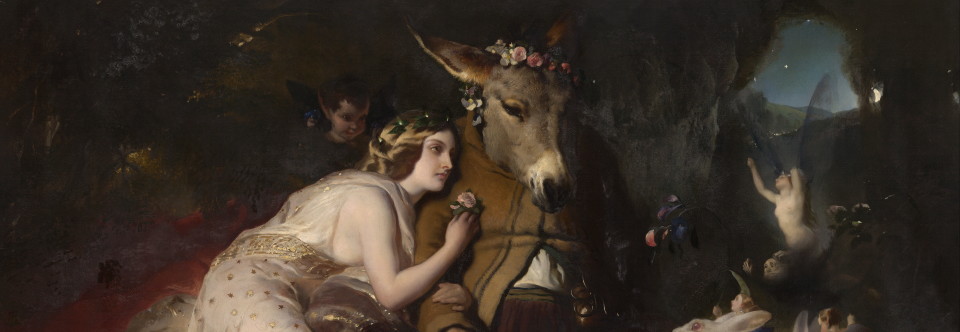
UPDATE: Don’t forget that Middle Temple is putting on a performance of this play on 2 and 3 May, for which tickets are still available. Booking here.
This post was written by Paul Magrath, Head of Product Development and Online Content at ICLR, who also tweets as @maggotlaw. It does not necessarily represent the opinions of ICLR as an organisation. Comments welcome on Twitter @TheICLR.
